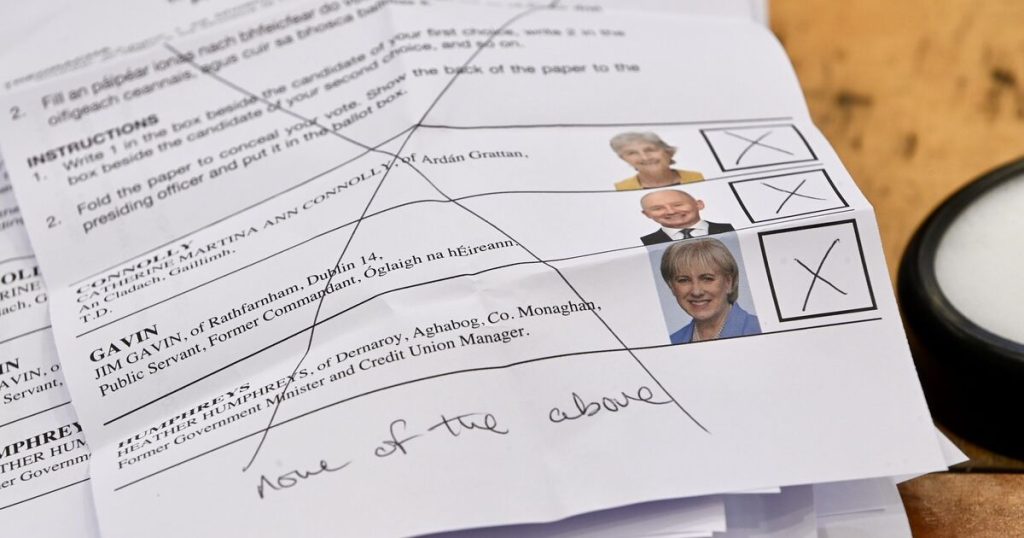Listen to the article
Online Disinformation Surged During Irish Presidential Campaign, Report Finds
A comprehensive investigation has revealed how social media platforms became breeding grounds for election disinformation, hate speech, and personal attacks during Ireland’s recent presidential election. The joint study by the Institute for Strategic Dialogue and Hope and Courage Collective documented how legitimate democratic expressions, particularly the “spoil the vote” campaign, were co-opted to spread harmful content.
The report identified 172 instances of political misinformation across major platforms including X, TikTok, Facebook, and YouTube during the six-week period leading up to polling day. Researchers found that while ballot spoiling itself is a legitimate form of political expression, online sharing of spoiled ballots “allowed racist and far-right messaging to blend with broader narratives related to political disillusionment and legitimate civic protest.”
“The result was the emergence of an online environment in which anti-migrant and anti-LGBTQ+ sentiments were expressed as supposed defences of democracy or moral order,” the report stated.
Last month’s presidential election saw independent candidate Catherine Connolly secure a decisive victory over Fine Gael’s Heather Humphreys. Fianna Fáil’s Jim Gavin had exited the race prior to election day. The campaign period was marked by what researchers described as “renewed threats to election integrity” as social media companies failed to enforce their own policies.
All three candidates faced significant online harassment. Humphreys was subjected to sectarian abuse, while Connolly appeared in fabricated news reports created using artificial intelligence. Gavin became the target of unsubstantiated claims about his private life, originating from sources outside Ireland. These claims were only removed after his campaign team reported them and Gavin publicly denounced them as “malicious smears.”
The final election results showed an unusually high number of invalid ballots, with approximately 213,000 votes – nearly 13% of all ballots cast – being spoiled. While the act of spoiling ballots is not inherently problematic, researchers noted that images showing explicit forms of hatred written on spoiled ballots circulated widely on social media platforms.
“This dynamic reflects a wider trend in Ireland and across Europe, where ‘moral’ or ‘patriotic’ grievances are used to normalise racism and hostility toward minority groups under the banner of protecting national or cultural ‘integrity’,” the researchers warned.
The report highlighted systemic failures by major technology companies to fulfill their obligations regarding electoral integrity. Edel McGinley, executive director of the Hope and Courage Collective, explained that “the majority of the harmful narratives identified in this report gained traction because they were promoted through algorithmic systems designed to reward outrage and emotional intensity.”
These findings come amid growing concerns about social media’s role in democratic processes worldwide. While companies like Meta (formerly Facebook), X (formerly Twitter), and Google have implemented various safeguards against election interference in recent years, critics argue these measures often fall short during actual campaigns.
“Ultimately, the findings of this report underline the need for stronger co-ordination between platforms and regulators in safeguarding electoral integrity,” McGinley noted. She called for the implementation of measures such as the EU’s Democracy Shield initiative and the activation of Part 5 of Ireland’s Electoral Reform Act, which would provide “essential tools for countering manipulation and keeping Ireland’s elections free from manipulation and interference.”
The report adds to mounting evidence that social media platforms continue to struggle with content moderation during critical democratic events, despite public commitments to improve. As Ireland reflects on this election, the findings raise important questions about digital regulation and the responsibilities of technology companies in preserving democratic processes.
Fact Checker
Verify the accuracy of this article using The Disinformation Commission analysis and real-time sources.



